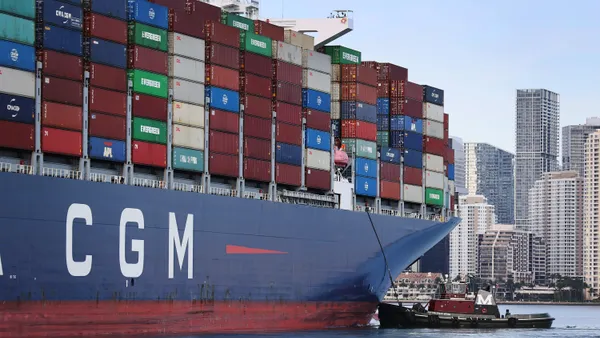Dive Brief:
- Adidas will increase its use of air freight as part of an attempt to recover from "supply chain shortages" executives say will affect sales growth for most of 2019, according to the company's second-quarter earnings call.
- Apart from upping air freight, Adidas has gone through its suppliers to find where there might be extra capacity and, in some cases, authorized overtime. It is also looking for new suppliers.
- "We are making the progress that we need to make but we will not see in the numbers before end of the year," said CEO Kasper Rorsted, who also warned that the air freight cost for the next two quarters will be "substantial."
Dive Insight:
Adidas will take the hit of unanticipated product shortages not once, but twice. The first hit will be on revenue — the impact of the shortage will be around 200 million to 400 million Euro ($224 million to $448 million) in lost revenue, Rorsted said. The second hit will be on margin once the air freight costs take their toll.
Usage of air freight for shipping Adidas and Reebok goods was up slightly in 2018. Apparel, the category affected by the shortages, already had the highest use of air freight.
Rorsted said the impact on gross margin should be evident by the end of the year.
With an eye on margins, CFO Harm Ohlmeyer said inventory levels are "under strict control." The CFO is predicting a gross margin of 52% for 2019, which would mean a small increase from 2018's 51.8%.
"We have contracts in place that ensure us that we will have no supply constraint as of 2020," said Rorsted, describing the current challenge as a "temporary setback."
He would do well to ensure the speediest recovery possible. With a recently announced Beyonce collaboration hitting shelves by the end of the year, Adidas is about to meet a new customer with an appetite the brand may not have seen before. Such setbacks would meet a new kind of consequence if Adidas upsets the Beyhive.













